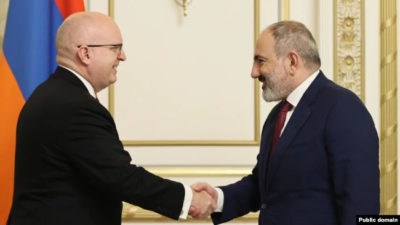WASHINGTON (Azatutyun) — The United States will spare no effort to continue to facilitate a resolution of the Armenian-Azerbaijani conflict, a senior US diplomat said after visiting Baku and Yerevan this week.
“We firmly believe that continued direct dialogue and diplomacy, not military action, is key to resolving issues and to reaching a comprehensive lasting peace and prosperity for all,” Philip Reeker, a senior adviser for Caucasus negotiations at the State Department, said in a video address released by the US Embassy in Armenia on Friday. “We all understand that this is not easy.”
Washington is “committed to doing everything we can to support your efforts towards a durable peace,” Reeker added, echoing US Secretary of State Antony Blinken’s remarks made at the most recent meeting of the Armenian and Azerbaijani foreign ministers hosted by him in Washington on November 7.
Blinken spoke with Armenian Prime Minister Nikol Pashinyan and Azerbaijani President Ilham Aliyev by phone later in November. He urged the two sides to “schedule further talks as agreed in Washington,” according to the State Department.
Reeker, who is also the US co-chair of the Organization for Security and Cooperation in Europe (OSCE) Minsk Group, met with the Armenian and Azerbaijani leaders during his latest tour of the South Caucasus states.
Aliyev and Pashinyan were due to meet in Brussels on December 7. Aliyev canceled the meeting last week, objecting to French President Emmanuel Macron’s participation in it sought by Yerevan.










